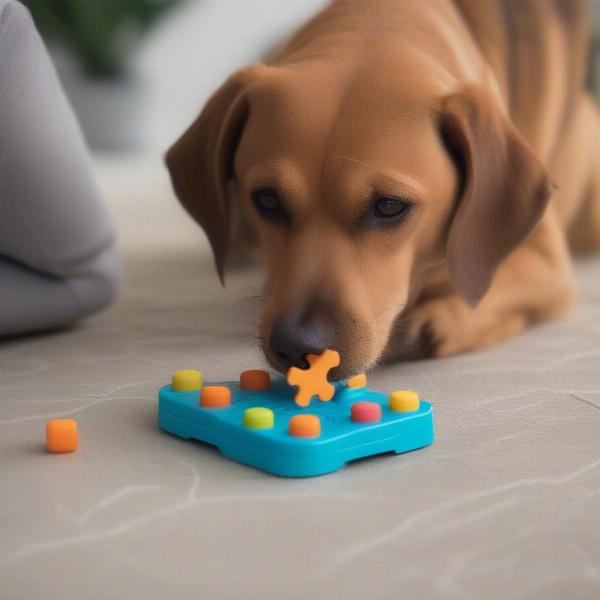Game-based dog training is a fun, engaging, and effective way to teach your canine companion new skills and strengthen your bond. This approach utilizes play and positive reinforcement to motivate your dog, making learning a joyful experience rather than a chore. Whether you’re teaching basic obedience or tackling complex tricks, game-based dog training can transform your training sessions into exciting adventures for both you and your furry friend. This method is suitable for dogs of all ages, breeds, and temperaments.
Why Choose Game-Based Dog Training?
Game-based dog training leverages your dog’s natural instincts to play and explore, making learning a positive and rewarding experience. It minimizes stress and frustration, common with traditional, stricter training methods. This method fosters a stronger bond between you and your dog, built on trust and mutual enjoyment. With game-based training, you’re not just teaching commands; you’re building a partnership based on communication and understanding.
Games keep dogs mentally stimulated, preventing boredom and reducing the likelihood of destructive behaviors. They also provide an excellent outlet for physical energy, contributing to a well-balanced and happy dog. For puppies, game-based training is particularly beneficial, providing essential socialization and helping them learn appropriate behaviors in a fun, non-threatening environment.
How to Incorporate Games into Your Dog’s Training
Start with simple games that teach basic commands like “sit,” “stay,” and “come.” “Hide-and-seek” is a great game for teaching “come.” Hide, call your dog’s name, and reward them with praise and a treat when they find you. For “stay,” try a game of “statue.” Reward your dog for staying still for increasing periods.
Gradually introduce more complex games as your dog progresses. Use their favorite toys and treats as motivators, keeping the training sessions short and fun. Remember to always end on a positive note, even if your dog doesn’t master the skill immediately. Consistency and patience are key.
Choosing the Right Games for Your Dog
Not all games are created equal. Select games that cater to your dog’s breed, age, and personality. High-energy breeds like Border Collies thrive on games involving chasing and fetching, while a more laid-back breed like a Bulldog might prefer puzzle toys or scent-based games.
 Dog playing with a puzzle toy
Dog playing with a puzzle toy
Common Game-Based Training Mistakes to Avoid
Avoid pushing your dog too hard. Frustration can quickly turn a fun game into a negative experience. Keep the training sessions short and sweet, and always end on a high note. Don’t use games to punish or correct unwanted behaviors. Game-based training should always be a positive experience. Remember to adapt the games to your dog’s individual learning style and pace. What works for one dog might not work for another.
Conclusion
Game-based dog training is a revolutionary approach that transforms training into a joyful experience for both you and your furry companion. By incorporating play and positive reinforcement, you can build a strong bond with your dog, teach essential skills, and foster a lifelong love of learning. So, ditch the old-school methods and unleash the fun in learning with game-based dog training.
FAQ
-
Is game-based dog training effective for all breeds? Yes, game-based training can be adapted to suit any breed’s temperament and energy level.
-
Can I use game-based training for older dogs? Absolutely! Game-based training is a great way to keep senior dogs mentally and physically stimulated.
-
How long should game-based training sessions last? Keep sessions short, typically 5-10 minutes, to maintain your dog’s focus and enthusiasm.
-
What if my dog doesn’t seem interested in the games? Try different games to find what motivates your dog. Experiment with various toys, treats, and activities.
-
Can game-based training address behavioral issues? While game-based training can be helpful for some behavioral issues, it’s essential to consult a professional dog trainer for serious problems.
-
Is game-based training a replacement for traditional training methods? Game-based training can be used as a standalone method or in conjunction with traditional techniques.
-
Where can I find more information on game-based dog training resources? There are numerous online resources, books, and dog trainers specializing in game-based training methods.
ILM Dog is your global resource for all things canine. We offer expert advice on dog breeds, health, training, nutrition, grooming, and much more. Whether you’re a new dog owner or a seasoned pro, ILM Dog provides reliable, practical information to help you navigate every aspect of dog care. Contact us at [email protected] or +44 20-3965-8624 for personalized guidance. Visit ILM Dog for more insightful articles and resources to enhance your dog’s life.